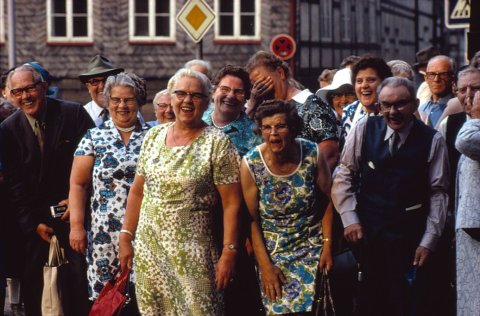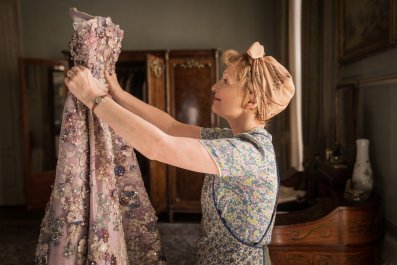Not long ago, Julie Ober Allen noticed that her teenage son was constantly teasing her about being old. His attitude annoyed her, until she realized where he got it from: herself. "I make jokes about aging all the time," she says.
Allen's own behavior surprised her. As a health disparities expert at the University of Oklahoma, she spends a lot of time studying discrimination—and here she was, letting all these negative beliefs about aging seep out in a constant stream of quips and self-deprecating humor.
Allen got another surprise when she completed a study on the health effects of such "everyday ageism." Not only are seemingly innocuous everyday slights highly prevalent, but the people most exposed to them were also more likely to have health conditions such as high blood pressure, diabetes, chronic pain and depression.
"There's this cumulative effect," Allen says. Because these putdowns and innuendos are so common and happen so frequently, "it adds up."
The study, published on Wednesday in JAMA Network Open, looked at about 2,035 Americans between the ages of 50 and 80, of which 93 percent encountered demeaning messages about aging on a regular basis.
These messages come in many forms: in supposedly harmless birthday cards that skewer old age ("You know you're getting older when it takes twice as long to look half as good"), in advertisements for wrinkle creams and face lifts, and from strangers who speak unnecessarily loudly. They come from the stories old people tell themselves, such as that loneliness and frailty are an inevitable part of aging, or when they refer to their own forgetfulness as a "senior moment." They are contained in backhanded compliments like, "You look great for your age," or "You haven't aged a bit."
Psychologists call such comments and behaviors microaggressions. A recent analysis of 141 previous studies found they were associated with depression, anxiety, lower job satisfaction and poor self-esteem in targeted groups including African Americans, women and the LGBTQ+ community.
Major instances of ageism, such as being denied a job or transplant organ, have been well documented, but this study by Allen and her colleagues is the first to confirm the universality of minor but pervasive forms of age discrimination, and to show the potential negative health consequences in a large, nationally representative group of people. Notions that aging is unattractive and undesirable and that older people are a burden are so normalized that people often don't recognize them as problematic, she says.
"They may be called micro, but they have macro impact, and that's the thing that a lot of people don't realize," says Dr. Derald Wing Sue, a professor at Teachers College, Columbia University who was not involved in the study. Although age-focused microaggressions have gotten less attention than ones directed at racial minorities, Sue says they fit the same pattern. "It doesn't surprise me that older individuals experience the impact," he says, "because they become marginalized as they grow older."

Microaggressions can be insidious because they are often unintentional and may even come from a desire to be nice. For example, someone may offer to help an older person cross the street even though the person is capable and did not seek assistance. Calling out ageist slights can be tricky because people may dismiss a complaint as unreasonable—or even fail to recognize that anything problematic has occurred.
That's what happened to Pat Jaffe, a retired filmmaker, when she recently went for a routine electrocardiogram and the cardiologist addressed her as "young lady." Jaffe, who is 97, felt she was being patronized, so she spoke up. "I said to her, I'm not a young lady. I'm an old lady," she recalls.
Instead of apologizing, the doctor doubled down, asking, "Would you mind if I call you dear?" At that point, Jaffe gave up and wrote the situation off as humorous. "She obviously had no idea why I was stressed about it," she recalls.
For the new study, Allen's team created a 10-item survey that asks people how often they have experiences or thoughts such as: "I hear, see, and/or read things suggesting that older adults and aging are unattractive," "Having health problems is part of getting older," and "People assume I do not do anything important or valuable." In addition to responding to the survey, study participants answered questions that aimed to assess their health in four ways: how they rated their overall physical health and their overall mental health, the number of chronic conditions they had, and whether they were depressed. After running the numbers, the investigators found that those with higher everyday ageism scores were at increased risk for health problems on all four measures.
A study of this kind can't say definitively whether ageism actually caused the health problems. But it aligns with work by pioneering researcher of aging Becca Levy at Yale School of Public Health, whose experiments suggest that ageist beliefs have a direct impact on individuals' wellbeing. Levy's team has brought older people into the lab and exposed them subliminally to both positive and negative stereotypes about aging, then tested their performance on various tasks. They have found that negative stereotypes raise people's blood pressure and cause them do worse on memory tests, whereas absorbing positive messages about aging improves their physical strength and balance , walking speed, and will to live.
Ageist messages infiltrate people's minds and bodies in various ways. For example, Levy has found that people with positive ideas about aging tend to eat more healthful foods and have lower levels of the stress hormone cortisol. Allen hypothesizes that being bombarded by everyday ageism may continually trigger elevated cortisol levels and blood pressure, worsening conditions like heart disease and diabetes. "Ageism is a source of chronic stress," she says. "And when people experience chronic stress, it can contribute to the development of chronic health conditions."
The irony, experts say, is that older age actually has many benefits. Although people do tend to develop physical limitations, on an emotional level they are often happier, more resilient and better problem solvers. They whittle their friends to the ones that count and experience more life satisfaction. "Aging is about some physical decline, but it's also about growth," says Dr. Tracey Gendron, a gerontologist at Virginia Commonwealth University who was not involved in the study. "Someone says, 'My knee hurts, my back hurts.' I understand that completely. And that is a part of the aging experience. But I also encourage people to think about things they like better about themselves now than they did five years ago, 10 years ago, 20 years ago. How have you grown? What skills have you developed?"
Instead, people are immersed from childhood in assumptions that prime them to fear aging. "It's the air we breathe, the water in which we swim," says Gendron, whose book Ageism Unmasked was published in March. But the good news is that when people ignore the cliches and embrace aging, they tend to thrive. Gendron points to a classic study by Levy's team that found that people who had positive perceptions of aging in their later years lived on average 7.5 years longer.
Documenting everyday ageism helps people notice these negative messages, Gendron says. "Once you see it, you can't unsee it." The next step, she says, is to push back because that raises other people's awareness. "To be able to say, 'That makes me uncomfortable,' or 'What are you trying to say by that?' Or to reframe for someone: 'I think you're using 'old' with judgment. I'm old and there's nothing wrong with that.' These are all little things that we can do. But it takes bravery and practice."
For her part, Allen is less likely nowadays to joke that her minor physical complaints are a sign of aging, but she notices such comments all the time, even among people who are attuned to other forms of discrimination. "I spent the weekend at an academic conference," she wrote in an email, "and my colleagues made so many ageist comments that I got tired of calling them out on it."










